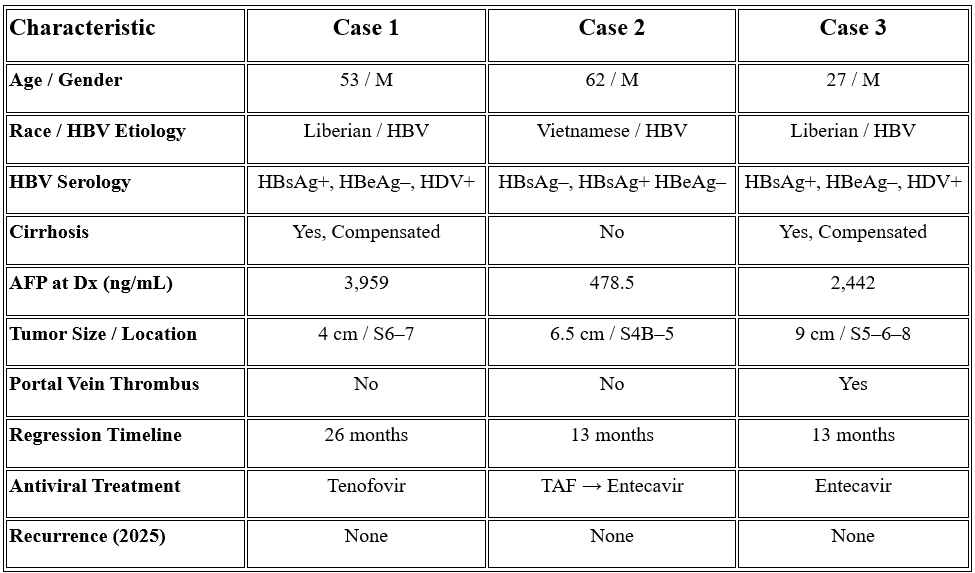Monday Poster Session
Category: Liver
P3966 - Spontaneous Remission of Hepatocellular Carcinoma in Chronic Hepatitis B: A Case Series
Monday, October 27, 2025
10:30 AM - 4:00 PM PDT
Location: Exhibit Hall

Gopala Koneru, MBBS
University of Iowa Hospitals & Clinics
Iowa City, IA
Presenting Author(s)
Gopala Koneru, MBBS, Alp S. Kahveci, MD, Alexander Garza, MD, Tomohiro Tanaka, MD, PhD
University of Iowa Hospitals & Clinics, Iowa City, IA
Introduction: Hepatocellular carcinoma (HCC) is the fifth most common cancer and the prognosis of advanced HCC is low. The spontaneous regression of HCC, which refers to tumor regression in the absence of treatment, is extremely rare and occurs in fewer than 1% of HCC cases. Insight into the mechanisms responsible for these regressions may provide insight in the biology of tumor and in future therapeutic strategies. We report three cases of spontaneous regression of HCC in patients with chronic HBV infection.
Case Description/
Methods: Case 1: A 35-year-old Liberian born male with chronic HBV, Hepatitis D (HDV) co-infection, and compensated cirrhosis was diagnosed with a 5cm HCC on imaging and Alpha-fetoprotein (AFP) of 3959 ng/mL. On follow-up imaging few months later, there were subcapsular hemorrhagic in the mass without typical HCC features. Without intervention, AFP normalized, and imaging demonstrated complete tumor regression 26 months.
Case 2: A 69-year-old Vietnamese born male, with serology suggesting prior HBV infection and clearance with subsequent low-level viremia, diagnosed with chronic HBV with imaging showing have a 6.5 cm HCC. Interval imaging over 37 months showed signs of regression and AFP decreased from 478.5 ng/mL to < 5 ng/mL.
Case 3: A 27-year-old Liberian man with chronic HBV and HDV co-infection, presented with a 9 cm infiltrative hepatic mass (HCC), portal vein thrombus, and AFP of 1429 ng/mL. The patient declined systemic therapy and opted for lifestyle changes. Subsequent imaging 13 months later showed complete tumor regression, with AFP normalizing and no detectable tumor six years post-diagnosis.
Discussion: These cases highlight the rare occurrence of spontaneous HCC regression in patients with chronic HBV infection. Common features include male gender, foreign birth, HBeAg-negative status, low viral loads, right lobe tumor location, significantly elevated AFP levels at diagnosis and placement on antiviral treatment (Table 1). The regressions occurred over 1–3 years without recurrence. Potential mechanisms may involve tumor hypoxia and host immune responses, such as CD8+ T-cell activity, macrophage infiltration, and cytokine release (e.g., TNF-α, IL-18). Understanding these mechanisms may inform novel immunotherapeutic strategies for HCC.

Figure: Table 1: Patient demographics, laboratory values and clinical characteristics
Disclosures:
Gopala Koneru indicated no relevant financial relationships.
Alp Kahveci indicated no relevant financial relationships.
Alexander Garza indicated no relevant financial relationships.
Tomohiro Tanaka indicated no relevant financial relationships.
Gopala Koneru, MBBS, Alp S. Kahveci, MD, Alexander Garza, MD, Tomohiro Tanaka, MD, PhD. P3966 - Spontaneous Remission of Hepatocellular Carcinoma in Chronic Hepatitis B: A Case Series, ACG 2025 Annual Scientific Meeting Abstracts. Phoenix, AZ: American College of Gastroenterology.
University of Iowa Hospitals & Clinics, Iowa City, IA
Introduction: Hepatocellular carcinoma (HCC) is the fifth most common cancer and the prognosis of advanced HCC is low. The spontaneous regression of HCC, which refers to tumor regression in the absence of treatment, is extremely rare and occurs in fewer than 1% of HCC cases. Insight into the mechanisms responsible for these regressions may provide insight in the biology of tumor and in future therapeutic strategies. We report three cases of spontaneous regression of HCC in patients with chronic HBV infection.
Case Description/
Methods: Case 1: A 35-year-old Liberian born male with chronic HBV, Hepatitis D (HDV) co-infection, and compensated cirrhosis was diagnosed with a 5cm HCC on imaging and Alpha-fetoprotein (AFP) of 3959 ng/mL. On follow-up imaging few months later, there were subcapsular hemorrhagic in the mass without typical HCC features. Without intervention, AFP normalized, and imaging demonstrated complete tumor regression 26 months.
Case 2: A 69-year-old Vietnamese born male, with serology suggesting prior HBV infection and clearance with subsequent low-level viremia, diagnosed with chronic HBV with imaging showing have a 6.5 cm HCC. Interval imaging over 37 months showed signs of regression and AFP decreased from 478.5 ng/mL to < 5 ng/mL.
Case 3: A 27-year-old Liberian man with chronic HBV and HDV co-infection, presented with a 9 cm infiltrative hepatic mass (HCC), portal vein thrombus, and AFP of 1429 ng/mL. The patient declined systemic therapy and opted for lifestyle changes. Subsequent imaging 13 months later showed complete tumor regression, with AFP normalizing and no detectable tumor six years post-diagnosis.
Discussion: These cases highlight the rare occurrence of spontaneous HCC regression in patients with chronic HBV infection. Common features include male gender, foreign birth, HBeAg-negative status, low viral loads, right lobe tumor location, significantly elevated AFP levels at diagnosis and placement on antiviral treatment (Table 1). The regressions occurred over 1–3 years without recurrence. Potential mechanisms may involve tumor hypoxia and host immune responses, such as CD8+ T-cell activity, macrophage infiltration, and cytokine release (e.g., TNF-α, IL-18). Understanding these mechanisms may inform novel immunotherapeutic strategies for HCC.

Figure: Table 1: Patient demographics, laboratory values and clinical characteristics
Disclosures:
Gopala Koneru indicated no relevant financial relationships.
Alp Kahveci indicated no relevant financial relationships.
Alexander Garza indicated no relevant financial relationships.
Tomohiro Tanaka indicated no relevant financial relationships.
Gopala Koneru, MBBS, Alp S. Kahveci, MD, Alexander Garza, MD, Tomohiro Tanaka, MD, PhD. P3966 - Spontaneous Remission of Hepatocellular Carcinoma in Chronic Hepatitis B: A Case Series, ACG 2025 Annual Scientific Meeting Abstracts. Phoenix, AZ: American College of Gastroenterology.

